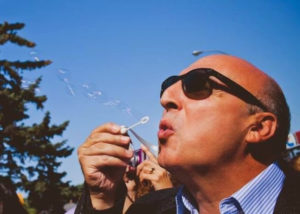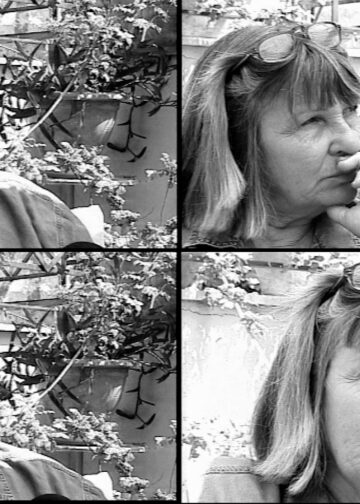October, 1909, Brancusi studio, 54 rue du Montparnasse
Or a short history of Modi’s career as a sculptor
The new Modi is actually the old Modi
Returned to Paris in sartorial splendor
Loose grey shirt, broad silk knotted scarf
Dark leather boots and pants
One bent leg on the bench leans forward
In the photo he looks defiant and posed, cigarette in left hand,
Other hand is on his right hip, eyes wounded and vague
Affair with Elvira is new
The vogue in Montmartre: cocaine, ether, lesbianism and Cubism
-2-
Between 1909 and 1912 Modi and I work together
Reject Rodin’s method of first constructing the work
Using clay shaped over and over again
On an armature then a plaster cast, next a metal mold
Filled with red hot bronze and left to cool
I tell Modi: ‘What good is the practice of modeling?
It leads to sculptured cadavers.’
Only what has been cut from stone beginning to end is true sculpture
Stone waits for the sculpture to release image already there
The same way paper waits for the poem
Both emerge from the will to shape desire
Create and organize surprise with each cut, each word.
-3-
Modi moves between Montmartre and Montparnasse
Between painting and sculpture
Between two groups of artists who often hate each other
Steals wood and stone from Metro construction sites
We sometimes carve together
From my cuts face emerges round as a pear
Curved stone refined like a scalloped shell
Modi carves mysterious posed masks
Nose cut sharp as a knife, slanted olive-eyes
Pressed small thin lips, chorographic hair like tiny rivers
Compressed serene sorrow surges into and out of stone
-4-
Augustus John the Welsh Painter visits Modigliani’s studio in Montmartre
Buys two sculptures: ‘For some days afterwards I found myself
Under the hallucination of meeting people in the street who might
Have posed for them… Can Modi have discovered a new secret aspect of reality?’
-5-
Meanwhile near Place Saint Michel, the cut poem:
In a station of the Metro
The apparition of these faces in the crowd;
Petals on a wet, black bough
Ezra Pound
-6-
Nina Hamnett, artist, writer, bisexual Queen of Bohemia (Paris)
Visits Modigliani’s messy and dirty studio on rue St. Gothard
Admires full figured sensual caryatid drawings on the wall
For an unfinished ‘temple of pleasure’,
Carved heads, ‘pillars of tenderness,’ are under the window
Near the end of the bed is a large spider web and a large black spider
He has grown attached to it he says
Calls the spider his only painting companion
Does not wish to disturb
Flattered, she can ignore poverty
But the spider makes her nervous and refuses him
Nina then dance naked for me again, he says
The way you did at the Café Rotonde
Let me delight in your slender legs and body
Large tear-drop tits, neatly trimmed and scented red pubic hair.
Anna Akhmatova, Paris, April, 1910 & May, 1911
After three years of pursuit, declarations of love
I married a famous poet, literary critic, traveler
I do not know whether or not I love Nicolay Gumilyov
It seems it is my fate to be his wife
We are here on our honeymoon
He gives lectures, attends meetings
I sit in the same café everyday and drink my morning coffee
Dryly read the newspaper, write in my journal
-2-
Modigliani’s beautiful classical French fell on me
Like an unexpected shadow from a Baudelaire poem
I cannot forget his voice, in his eyes a golden gleam
Accompanied by exquisite manners
No friend, no past lover, never mundane things
Only a quiet ring of solitude and a love of sculpture
‘He was that rarity, a painter who knew and loved poetry.’
Recited by the hour Laforge, Mallarme, Lautréamont
-3-
A year later waits for me in the Salon des Independants
He does not approach when I finally appear
Instead we visit the Egyptian department at the Louvre
He dreams only of Egypt ‘the rest is of no importance.’
Rejects Cubism, anything fashionable,
Makes little money, winter in Paris is harsh
He is thinner, eyes sunk deeper
Proud aristocrat heart and soul
How does he survive?
Still handsome next to the Venus di Milo, he says:
‘Women of beauty worthy of painting or sculpting
seem heavily dressed in their clothes.’
-4-
Firm right hand moves forward and back again like a wave
He draws a quick thin charcoal line
Then an unexpected curve
Slanted eyeless head rests on my slender shoulder
Arm on an angle
Singular small round tit captured
So is the gentle bump of my stomach
I emerge a sleeping nude Venus on cushions
Fresh from the blank white sea.
He squints to study each line, lips pressed concentrating
Satisfied he kisses my toes
Considers the inside of my knee
I let him travel up the length of my thigh
Inhale my scent
Pauses to ask about the little prisoner
Trapped at the top of my moist hill
I blush pink, red, and white like a cherry blossom.
Slow sly shy grin emerges
He says my face shows divine progress.
-5-
On a bench in the Jardins du Luxembourg
Recited Verlaine under his old black umbrella
Delighted we remembered the same verses
Soft tap of summer rain kept the beat
At night it was his footsteps under my window.
-6-
His door locked
I toss a surprise bouquet of roses
One by one through an open window
He returned to find a formed charmed pattern
Convinced I somehow entered.
–
-7-
You say I ignite you
Through poems
Your gypsy soul flares
I am your female Cesare:
I found, I saw, I know
Your sad eyed mystery opens and closes
Shadow on the claire de lune streets of the Latin Quartier
-8-
Our destiny began when I did not return to Paris
Melancholy and poems followed
Both were there already under our skin, our eyes
Tarnish already there inside the dream, on the silver streets
Never in my heart.
Multiples of Me
I am a handsome elegant Italian young man
So lordly, so cultivated, so exquisite, so kind-hearted
Lover, artist, even-tempered, distinguished
Corrupted by Paris, corrupted by Lautréamont
I am an unbearable buffoon,
I cannot stand nor keep away from alcohol
The weak author of my own downfall
Ruined by drugs, by La Vie Boheme, by poetry
By women and song, by youth, by poverty
By an indulgent mother, by artists, by masks
I am the most literate painter in all of Montparnasse
I memorize Dante, Leopardi, Villon, Baudelaire, Nietzsche
I am psychic and follower of Nostradamus
I am the one who believes the artist is an aristocrat of feeling
I reject in no particular order: Renoir’s aesthetic (nudes) caressing buttocks,
Rodin, Picasso & the Cubist crowd, Futurists, bourgeois domesticity,
Systems of power, narrative paintings, background, the light in Nice
I am the painter everyone remembers after the world made famous
I am the painter made famous by disaster, failure, and Garsin irony.

Carmelo Militano is an award winning poet & writer.Hi smost recent novel Lost Aria, Ekstasis Edition 2018 has been shortlisted for the Margaret Laurence Award for fiction.He won the F.G. Bressani award for poetry in 2004 for his chapbook Ariadne’s Thread. His poetry includes the collections Morning After You and The Stone Mason’s Notebook. Militano’s novel Sebastiano’s Vine was short-listed for the Margaret Laurence fiction prize and his non-fiction work The Fate of Olives was also short-listed. His reviews, essays, and literary interviews have appeared in journals across Canada. Militano currently hosts and produces the P.I. New Poetry show, CKUW 95.9 FM, University of Winnipeg. Lost Aria is his fifth book.





















































